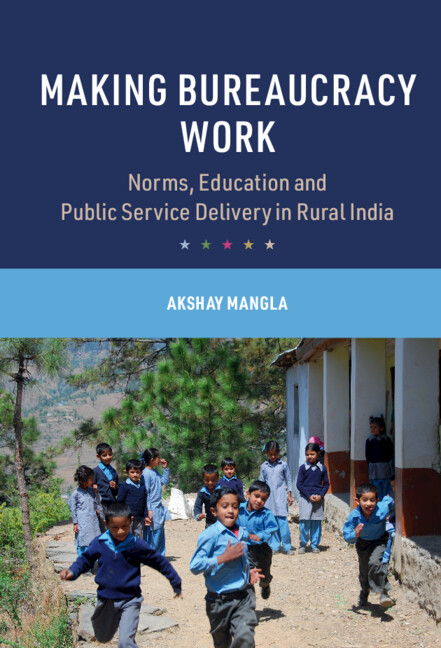Breadcrumb
Dr Akshay Mangla joins Dr Maya Tudor plus Professors Clare Leaver and Jane Gingrich for the launch of his new book Making Bureaucracy Work: Norms, Education and Public Service Delivery in Rural India.

About the book
What makes bureaucracy work for the least advantaged? Akshay Mangla explores this question in his new book, Making Bureaucracy Work: Norms, Education and Public Service Delivery in Rural India (Cambridge University Press, 2022). Countries across the world have policies for universal primary education, but implementation is highly uneven and not well understood. To explore this varied performance, Mangla analyses the puzzling differences in education outcomes in rural north India, a highly unequal setting in which existing theories largely expect bureaucracy to fail. Based on a multi-level comparative research design and twenty-eight months of field research, Mangla opens the “black” box of Indian bureaucracy, tracing policy implementation processes from state capitals down to local districts and village primary schools.
Making Bureaucracy Work advances a novel theoretical argument anchored on differences bureaucratic norms, the informal rules of the game that guide how public officials understand their duties and relate with citizens on the ground. While some public agencies operate in a legalistic manner and promote compliance with policy rules, others engage in deliberation and encourage flexible problem-solving with local communities, thereby enhancing the quality of education services. This book reveals the complex ways bureaucratic norms interact with socioeconomic inequalities on the ground, illuminating the possibilities and obstacles for bureaucracy to promote inclusive development. This book reveals the complex ways bureaucratic norms interact with socioeconomic inequalities on the ground, illuminating the possibilities and obstacles for bureaucracy to promote inclusive development.
About the author
Akshay Mangla is an Associate Professor of International Business at Saïd Business School, University of Oxford. His research examines the institutions and politics of inclusive development, with a focus on governance, bureaucracy, public services and state-society relations. His research has been supported by the Jameel Poverty Action Lab (J-PAL), the World Bank, the Research England Global Challenges Research Fund, the American Institute for Indian Studies and the NSEP David L. Boren Fellowship. Akshay holds a Ph.D. in Political Science from the Massachusetts Institute of Technology Prior to joining Oxford, he was an Assistant Professor at Harvard Business School.




